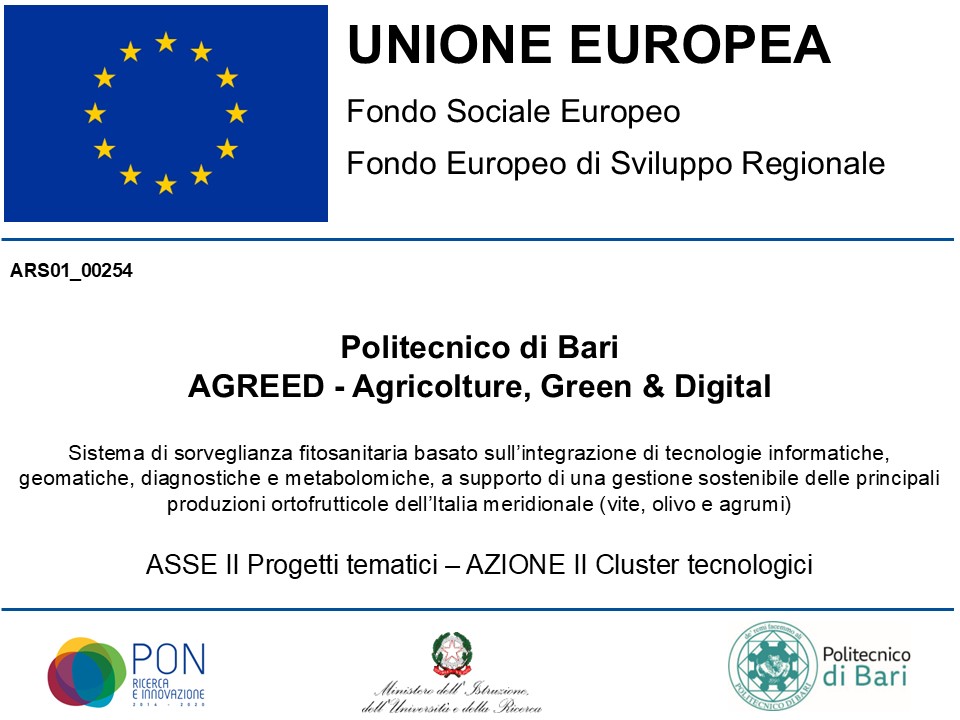

The project is an Industrial Research and Experimental Development initiative under the Italian PNR 2015-2020 framework, focusing on sustainable agriculture and digital technologies. It integrates advanced IT solutions, geomatics, predictive, diagnostic, metabolomics, and sensing technologies to enhance plant health surveillance and crop protection. The project promotes environmentally friendly and safe agricultural production.
The overall objective of the project is the development of an innovative IoT system for plant and animal health surveillance and management, which integrates advanced information technology, geomorphological, forecasting, diagnostic and metabolomic technologies, while respecting the environment, safety and health of fruit and vegetable production. The integrated platform AGREED is multi-disciplinary, multi-source and multi-actor. It does not only provide a DSS for plant protection services and manufacturers, but it also incorporates tools and technical means for activating precise plant protection interventions.
The specific objectives are:
- Detection/prevention of outbreaks of infection;
- Real-time availability of reliable information on the presence and spread of infection (spatial and temporal);
- Implementation of possible containment/control measures, including through precise and eco-friendly phytosanitary interventions
The system will include the integrated development of the following products/processes/services/systems/technologies/applications within the individual.
WBSs:
- Deep contextualization of the "problem to be solved" in terms of: - Phytosanitary management protocols; - More advanced technologies available; - High level architecture of the AGREED system;
- Multi-Source Detection and Multiple Source Detection System Design on Target Pathogens: - WSNs (Wireless sensor networks) for microclimate and eco-physiological (TreeTalker) systems: - Selection of wavelengths based on molecular and metabolomic analyzes for diagnostic sensor; - Diagnostic prototype sensor for selective detection of target phytopathologies; - Prototype diagnostic "Real-Time PCR" device for field molecular diagnostics;
- Design of the Smart Diagnostic Systems and Plant Protection: - AppFito (developed in Multitrace PON MISE) integrated with new target pathogens modules; - Prototype computer tool for automatic recognition of the main photographic disease pathologies; - Prototype of a biological liquid dispersion platform (electrolyzed water) for drone plant protection treatments; - IoT plant for the treatment of microbial irradiation by means of irrigation system micro 28; - Phytosanitary protocols for drone and micro 28;
- Development of quantitative algorithms for remote sensing, epidemiological modeling of target and agro-environmental pathogens: - Sentinel-1 Classification Algorithms, Sentinel-2, and Drone Images to Support Territorial Monitors; - Prediction models of target pathogens, phenological phenotypic phenomena and water footprint of plant protection interventions; - Predictive epidemiological models of target infections (plant varieties, climatic conditions in southern Italy); - High resolution time monitoring system for identifying relationships between biotic and abiotic stress vulnerabilities, and response to pesticides at different environmental and climatic conditions; - Water-soil-plant interaction models to quantify the qualitative impact of pesticides on water resources;
- IoT platform development that provides real-time analysis of large volumes of data: - Monitoring platform, remote control and customization of IoT devices and data collection; - Monitoring platform management dashboard, remote control and customization of IoT devices and data collection;
- Design and development of data lakes and large data analytics based on open source technologies, standards and interoperable interfaces: Validated data analytics platform;
- Development of advanced analytics platform AGREED: - Geospatial data warehousing modeling areas of experimentation; - Advanced analysis tool for prediction and containment of phytopathologies on target species; - Targeted intervention tool for dampers and diagnostic drums; - Phytosanitary chain management blockchain system; - Blockchain results and data presentation dashboards;
- Experimenting prototypes and disseminating results: - Business Plan; - Project Web Site; - Disclosure material; - Public Disclosure Meetings.
The development of the project will have secure and substantial employment implications. In the future exploitation of the platform, new skills and professional skills will be needed to use and manage the many features and data flows made available by AGREED. Improved crop management provided by integrated monitoring and forecasting systems will help to increase quality, food security and product sustainability in the regions of the South, by re-evaluating the areas of agriculture and specific crops in the regions of interest.
The goals pursued go in the direction of the development of ICT and Industry 4.0 technologies. This topic currently has a great strategic interest and a possible reappraisal of the agricultural areas linked to the use of AGREED, that will attract new investments as well as skills related to the potential of ICT tools applied to crop management. Drone platform monitoring systems and forward-looking modeling can increase the competitiveness of the proposing subjects in providing plant-protection solutions and crop management in the viewpoint of a smart agriculture climate.

